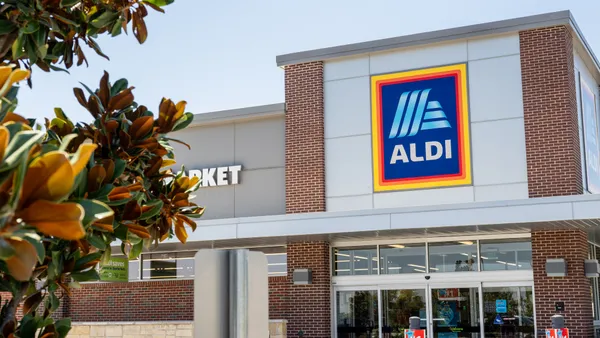Dive Brief:
- Schnuck Markets employees represented by United Food and Commercial Workers Local Union 88 have “overwhelmingly voted” to reject the grocer’s contract offer and authorize union leadership to call for a strike “should it become necessary,” the labor organization announced Thursday.
- The union claims that Schnucks’ offer jeopardizes union members’ health care plan and does not offer competitive wages.
- This move is the latest in a pattern of grocery workers post-pandemic demanding better labor practices.
Dive Insight:
Contract negations between the grocer and UFCW Local 88, which represents more than 1,000 Schnucks workers across Missouri and Illinois, began last January, UFCW Local 88 President Dan Telle said during remarks about Schnucks’ contract proposal posted on YouTube.
Telle compared the union’s proposal to the terms of Schnucks’ contract with workers who are part of UFCW Local 655. Those workers are “doing the very same work as you yet [the grocer puts] a value on you that is not equitable,” he said, adding, “Pay is more than just wages.”
Telle said Local 655 workers have sick days in their contract and every staff member receives at least $1 more per hour for working on a holiday.
“There are 1,242 Local 88 members working at Schnucks and only 57 receive any extra pay for working on a holiday,” Telle said. He also added that Local 88 is the only departmentalized group at Schnucks not eligible for sick days.
Telle said he brought the wage disparity to the attention of Schnucks three years ago, but has not seen an effort by the grocer to close the pay gap. For example, current wages for full-time meat, deli and seafood clerks at Schnucks who belong to Local 88 are $3.05 less per hour than what a Local 655 worker doing the same work receives, Telle said.
“I have to wonder if the Schnucks family is even aware of this disparity,” Telle said. “If maybe their negotiators neglected to show them. It does not make sense for a good family-owned company like Schnucks to allow this.”
The local union’s health and welfare coverage fund is also at risk, Telle said. The union president stated that Local 88’s coverage is a self-insured fund covering around 11 employers with approximately 2,000 participants.
At the end of the current fiscal year, the fund had 10.42 months of reserves, Telle noted. But Schnucks does not plan to increase its contribution to health and welfare coverage over the next three years, which would put the fund’s reserves “dangerously low” when the contract ends, Telle said. With two costly and unexpected cases “coming down the pipeline” that are expected to significantly impact the fund, Telle said he is fearful that by the end of the contract, the local union would be forced to dissolve the fund.
“Translated: healthcare coverage as you know it will be gone,” Telle said.
The most recent health and welfare trust meeting between the local union and Schnucks ended in a 3-3 deadlocked vote to increase the company’s attribution to the health and welfare fund, Telle said.
Earlier this year in April, Cub Foods stores in the Twin Cities area of Minnesota clinched a “historic” contract win, leading it to call off a two-day strike that was set to start at more than 30 corporate-owned Cub stores.










